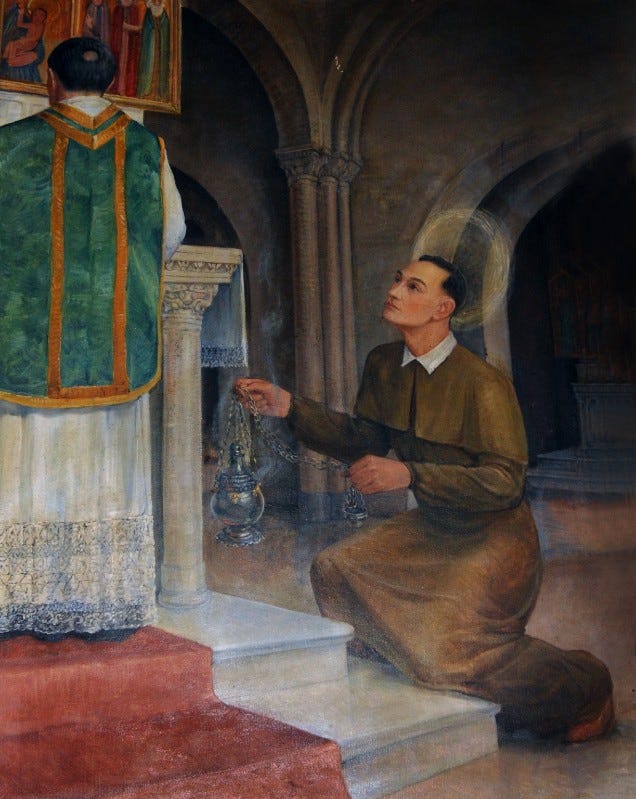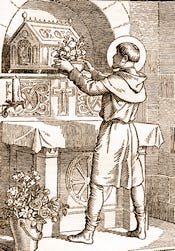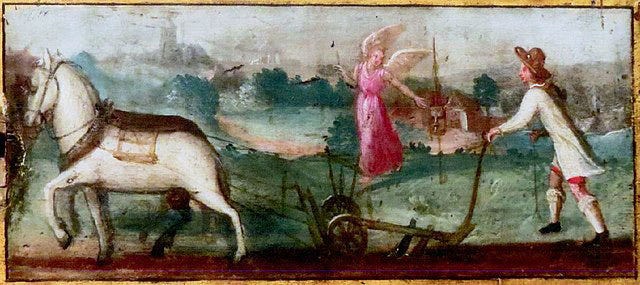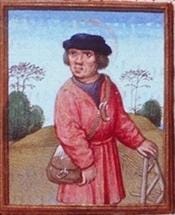Join me today to meet a peasant saint living at the end of the world.
Name: Guy, Guido, Wye, Winand, “The Poor Man of Anderlecht”
Life: c. 950 - 1012 AD
Status: Saint
Feast: September 12
You can listen to this as a podcast on Apple Podcasts, Pocket Casts, Spotify or right here on Substack. If you prefer video, you can also follow on YouTube and Odysee (unfortunately, videos on Odysee may be slower to update).
Sometime in the middle of the 10th century, a boy named Guy was born to peasants in the small town of Anderlecht, just West of Brussels in modern Belgium. Because Guy’s parents were poor, Guy received no education at all. The life that was unfolding before him was the life that peasants had lived for thousands of years before, although there was one twist.
If Guy made it into middle age, he might just live to see the end of the world.
Guy would turn fifty in the year 1000, which meant that one thousand years would have passed since the birth of Christ. The Book of Revelation talks about a thousand year interval before the end. Now it was also true that Jesus Himself said that only the Father knows the time of the end… but setting that aside, no one could deny that it had been a thousand years.
What is more, there had been signs heralding the end times. As the 11th century approached, Halley’s Comet illuminated the night sky. The social order that had grown up in Europe after the fall of the Roman Empire was crumbling under the attacks of a new kind of barbarian, the Vikings, who raided the coasts and sailed up the rivers in their longships.
Around Europe, many people waited for the Antichrist to emerge and usher in the end. Pilgrims hurried to Jerusalem to see it before the end began. The Benedictine chronicler and monastic troublemaker Ralph Glaber summed things up:
When some consulted the more watchful of the age as to what was meant by so many people, in numbers unheard-of in earlier ages, going to Jerusalem, some replied cautiously enough that it could portend nothing other than the advent of the accursed Antichrist who, according to divine testimony, is expected to appear at the end of the world. (J. France Translation)
This was the backdrop of Guy’s life. Guy’s parents raised him as a Christian, and his interest in the Church soon deepened. There weren’t many opportunities available for an early medieval peasant, but Guy decided that whatever he was doing, he would use it to search for God. And so it was that Guy, as a young man with no particular skills or abilities except faith, had to find his way in a world that might or might not outlast him.
Guy’s first step was to take after his father and become a farmhand. The tradition has it that he had a micromanaging boss. Only, the more the boss micromanaged Guy, the more the man began to notice odd things about his farmhand. He’d catch Guy lost in prayer, not working at all. But when he looked at what Guy was supposed to be doing, it had all been accomplished. The boss was irritated to see Guy give away food to others, but when the boss challenged Guy, all the food was still there.

Eventually, Guy’s boss was so thoroughly disturbed by what he had seen that he told Guy he had to go find work elsewhere. Guy wandered North, determined to figure out what God wanted him to do. In the village of Laeken, just North of downtown Brussels today, Guy wandered into a church. He stayed after the service. When the priest of the little church spoke to Guy, the priest was impressed. The priest, like the micromanaging boss, noticed that there was something unusual about this sincere, prayerful peasant. And as it happened, the priest had need of someone to help around the church: he was looking for a sacristan.
The job of sacristan turned out to be exactly the right thing for Guy. It wasn’t glamorous work. But even so, people started to notice the humble, generous peasant assisting the priest and preparing the vestments and vessels for Mass. They noticed, too, that often after the service, Guy quietly stayed in place, lost in prayer through the night. The job didn’t pay much. Guy sometimes begged, though careful observers saw that he gave away whatever he received to people who were even poorer than he was.
Being a sacristan meant that Guy’s understanding of the Mass deepened. He probably began learning some Latin, and may even have learned something of reading and writing. And so, as the years and decades passed, Guy quietly pursued sanctity and got an education on the side, and the dreadful year of 1000 came ever closer.
And then the fateful year arrived. Guy was in his fifties, the sacristan of the church in Laeken. And whatever preparations the locals made, the year 1000 came and went and the world continued. The people whom Ralph Glaber called the “more watchful of the age” realized they had been wrong. They saw their mistake. It was obvious, really: the thousand year period didn’t begin with Jesus’ birth. It began with His death. The end would definitely arrive in the year 1033 because, if anything, things were getting worse. Over in England, Wulfstan II, Archbishop of York, thundered to his flock that Antichrist was not far off.
Perhaps the sense that the end had been averted, that there was more time, was part of what made Guy begin to question his profession. It helped that around the turn of the millennium, he got a job offer. A local merchant asked Guy to go into business with him.
Some traditions suggest that Guy was being scammed - but it’s hard to see why it would be worth stealing Guy’s meager savings. My suspicion is that the years as sacristan had given Guy some skills that a merchant would find useful, skills like reading, and perhaps a personal if passing acquaintance of the local aristocracy. Guy’s experiences had prepared him to leave his social class and move up.
What really convinced Guy to leave his job as sacristan was when the merchant told him that if he became a businessman, Guy could increase his charity. Guy could earn real money and do something for the poor. Guy left his job. He and the merchant prepared a ship, buying the trading supplies and hiring a crew to sail her out. Guy and the merchant watched their ship, their investment, sail out of port. And then, soon after, they watched it begin to lean to one side. The ship capsized, ruining all of the cargo. Guy’s savings, what there were of them, were gone.
It was a huge disappointment. Guy’s chance to become something other than a peasant had failed, spectacularly. And yet this is where we see Guy at his most quietly heroic. A different man might have despaired. Guy puzzled about the failure. It seemed that God did not want him to become a rich man. God was calling Guy to live out his life as a poor man. Guy was willing to do that.
When Guy went back to the church where he had worked, they already had a new sacristan. But Guy knew another way to serve God. He would carry out what many of his contemporaries thought of as a prayer in physical space. Guy was going to go on pilgrimage.
Pilgrimages were dangerous. Before setting out, pilgrims usually settled their affairs in case they did not return. Guy had little that needed settling. For the next seven years, Guy lived the life of a pilgrim. He went to Rome, of course. And he travelled as far as Jerusalem. He probably did odd jobs or begged to keep himself going. He may have travelled with groups of pilgrims, perhaps joining an entourage like that of the Abbot Richard of Verdun, who travelled by land and
through innumerable trials along the road, through long and difficult labors, through waterless and uninviting wastelands, through the horrors caused by thieves and the terrors caused by Gentiles [i.e. non-Christians] (B.E. Whalen Translation)
Abbot Richard went to see places that were important from the life of Jesus, and finally bathed in the River Jordan. It’s likely that Guy followed a similar itinerary. And even here in Jerusalem there were signs of the end. The caliph of Egypt, encouraged, some whispered, by traitors living in Europe, had decided to destroy the Church of the Holy Sepulcher, as well as a church dedicated to Saint George. It was less and less safe to be a Christian in the Holy Land. To Guy and the other pilgrims, it must have seemed that things were moving toward some conflict. They would have been right, although the conflict, when it came, would be the wars we remember as the crusades.
Guy spent seven years as a pilgrim, walking across Europe and the Middle East, praying in the holy places, and then moving on. He was now probably in his early sixties, and he was getting tired. He wondered whether he was being called back home. And then, one day when he was on the road, he heard people speaking a familiar dialect. He had run into a group of his countrymen. It was the Dean of the church at Anderlecht and a group of his priests and religious. The churchmen were looking for someone to guide them to Jerusalem. It seemed like God was calling Guy to go out one more time, and so Guy set out with them, to guide them through the Holy Land. They must have discussed the question of the world’s end on the way.
But the delegation from Anderlecht was not fated to live to see 1033. On the way back, the men from Anderlecht began to get sick. It may have been dysentery. One man died. Then another. The Dean got sick too. Like many of those who spent time with Guy, the Dean had noticed something unusual about him. He gave Guy his gold ring, and asked Guy to carry his story to those back home. By the time Guy returned to Anderlecht, he was alone. He was sick too. He had no place to go, but when he showed the men at the church in Anderlecht the gold ring and told them the story of his fellow pilgrims, they found him a bed. Guy spent the last few days of his life at the church in his hometown of Anderlecht. He died a penniless pilgrim. By the time the year 1033 came and went, hardly anyone in his hometown even remembered Guy.
But then, as the decades passed, something odd began to happen. People began to remember Guy. Some dreamed about his tomb. The people of Anderlecht began to ask for Saint Guy’s intercession, and found help and healing. My favourite story is one of a man whose five year old son had never been able to walk. He laid the boy on the slab of the tomb of Saint Guy and began to pray. When the man looked up, his son was gone. The man panicked, and ran out of the church looking for his son. But the healing had been typical of Saint Guy, very low-key. The man’s son had been healed, and had gotten bored lying on the slab, so he had wandered out of the church and was playing with other children outside.

Gradually, the people of Anderlecht pieced together the story, connecting Guy who had come from Anderlecht with the quiet sacristan from Laeken and the haggard pilgrim. Guy had never married. He had never joined any religious order. He had stayed under the radar, trying to follow God’s will and live a life that would matter, even if the world passed away at the end of it. And this had led him to become one of the strange peasant saints of the Middle Ages, apparently ordinary people whose lives revealed flashes of the transcendent. A hundred years after Guy’s death, he was a beloved local saint, and the bishop had come to town to investigate the phenomenon. Saint Guy, the Poor Man of Anderlecht had come home.

If you enjoy the Manly Saints Project, please consider signing up for a subscription on Substack, or click here or on the logo below to buy me a beer.








